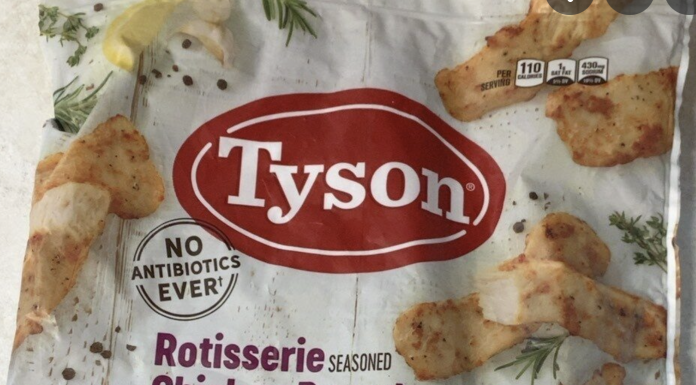FOOD SAFETY NEWS – Two Listeria monocytogenes illnesses in Texas and one in Delaware with one death between them is so far a small outbreak that’s brought on Saturday night’s massive recall of Tyson chicken.
Tyson’s Dexter, MO unit recalled almost 8.5 million pounds of ready-to-eat (RTE) chicken products because of those illnesses. See the complete list of recalled products, including product and date codes, on the USDA-FSIS website.
The federal Centers for Disease Control and Prevention (CDC) in Atlanta advises people not to eat, sell, or serve recalled products.
“items were shipped nationwide to retailers and institutions, including hospitals, nursing facilities, restaurants, schools and Department of Defense locations.” – USDA
Illnesses started on dates ranging from April 6, 2021, to June 5, 2021. Sick people range in age from 60 to 95 years, with a median age of 89, and 66% are male. All three people were hospitalized, and one death reported is from Texas.
“The true number of sick people in an outbreak is likely higher than the number reported, and the outbreak may not be limited to the states with known illnesses,” nationally-known food safety attorney Bill Marler says.
“This is because some people recover without medical care and are not tested for Listeria. In addition, recent illnesses may not yet be reported as it usually takes 3 to 4 weeks to determine if a sick person is part of an outbreak.”
State and local public health officials interviewed people about the foods they ate in the month before they got sick. All three people were in a long-term care facility or hospital when they got sick. These facilities served many food items, including meals with precooked chicken.
Public health investigators are using the PulseNet system to identify illnesses that may be part of this outbreak. CDC PulseNet manages a national database of DNA fingerprints of bacteria that cause foodborne illnesses. DNA fingerprinting is performed on bacteria using a method called whole-genome sequencing (WGS).
WGS showed that bacteria from sick people’s samples are identical. This suggests that people in this outbreak got sick from the same food.
USDA-FSIS found the outbreak strain of Listeria in two samples of precooked chicken products during routine product testing. Along with the epidemiologic data, this suggests that people likely got sick from eating pre-cooked chicken.
USDA-FSIS and state partners are collecting food purchase records from the long-term care facility and hospital to identify a common precooked chicken product that may be making people sick.
Until more is known, CDC is advising people at higher risk for severe Listeria illness and facilities caring for them to take extra precautions: reheat the precooked chicken to an internal temperature of 165°F and do not eat cold dishes made with precooked chicken unless the chicken was reheated before being used in the dish.
About the Recall
- Shipped nationwide to retailers and institutions including hospitals, nursing facilities, restaurants, schools, and Department of Defense locations
- Products include frozen, fully cooked chicken strips, diced chicken, chicken wing sections, and fully cooked pizza with chicken
- Products were sold under many brands including Tyson, Jet’s Pizza, Casey’s General Store, Marco’s Pizza, and Little Caesars
- The products subject to recall bear establishment number “EST. P-7089” on the product bag or inside the USDA mark of inspection
What Businesses Should Do
- Do not serve or sell recalled products.
- Long-term care facilities, hospitals, and other facilities that serve people at higher risk for severe Listeria illness should take extra precautions.
- Listeria is particularly harmful to people who are 65 years or older, pregnant, or have a weakened immune system.
- All of the sick people in this outbreak ate foods served at a long-term care facility or hospital.
- Follow USDA-FSIS’s guidance to prevent the spread and growth of Listeria.
What You Should Do
- Do not eat any recalled products. Throw them away or return them to where you bought them.
- Follow these five steps to clean your refrigerator, containers, and surfaces that may have touched the recalled products. Listeria can survive in the refrigerator and can easily spread to other foods and surfaces.
- Call your healthcare provider right away if you have these symptoms after eating recalled products:
- If you are pregnant: Fever and muscle aches. Your illness may be mild, but Listeria can cause pregnancy loss or premature birth. It can also cause serious illness or death in newborns.
- If you are not pregnant: Headache, stiff neck, confusion, loss of balance, and convulsions, in addition to fever and muscle aches.
About Listeria infections
- Food contaminated with Listeria monocytogenes may not look or smell spoiled but can still cause serious and sometimes life-threatening infections. Anyone who has eaten any recalled product and developed symptoms of Listeria infection should seek medical treatment and tell their doctors about the possible Listeria exposure.
- Also, anyone who has eaten any of the recalled products should monitor themselves for symptoms during the coming weeks because it can take up to 70 days after exposure to Listeria for symptoms of listeriosis to develop.
- Symptoms of Listeria infection can include vomiting, nausea, persistent fever, muscle aches, severe headache, and neck stiffness. Specific laboratory tests are required to diagnose Listeria infections, which can mimic other illnesses.
- Pregnant women, the elderly, young children, and people such as cancer patients who have weakened immune systems are particularly at risk of serious illnesses, life-threatening infections, and other complications. Although infected pregnant women may experience only mild, flu-like symptoms, their infections can lead to premature delivery, infection of the newborn, or even stillbirth.
(To sign up for a free subscription to Food Safety News, click here.)



